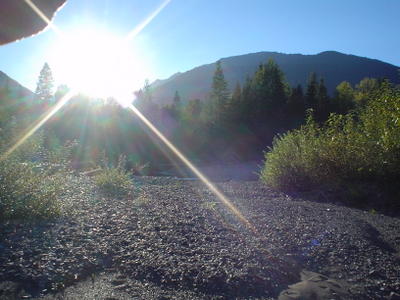In Whose Name?

Whose inimitable name is invariably invoked when religious fanatics wreak havoc in the world? The Great Spirit, Jehovah, Yahweh, Allah, Buddha, you name it. Some cultures go one better than simply confine themselves to a mono-spirit. China and Japan and likely Korea as well had no fewer than (is it?) eight Immortals to each of whom was attributed some sought-after virtue like happiness, long life, prosperity, you get the picture. These are powerful figures, these all-seeing, all-knowing, frightening, comforting beings who look down kindly or awfully, as the case may be, on the little figures of mankind who inhabit this world.
If there truly is life in other worlds in other galaxies within the Solar System would those other life forms have recognized in their way the utility of such a construct? Might they too have envisaged spirits directing their evolvement, both physical and spiritual? Might these life forms confine themselves to disparate groups, clans which seek to exclude the stranger, and whose other groups recognize their own guiding spirits? Is it possible that these life forms, perhaps different than ours, perhaps not, squabble among their clans and seek to expand their territory, claiming their spirits to be more powerful, more dread-inspiring than the others'?
In whose name, pray tell, (even the language reflects in so many ways the general and often all-encompassing belief in an inspired being whose sole purpose is to direct the lives of its humble adherents) does one group feel confident in claiming that their version of God is superior, more meaningful, in fact the only and one true God whose wrath will be brought down on unbelievers, infidels, atheists? Does their god move them toward these hostilities?
I AM THE LORD THY GOD, THOU SHALL HAVE NO OTHER GODS BEFORE ME. That's pretty authoritative, all right. But who wrote those words? Who proclaimed that great presence in the ether to be god, the one god the only god? Show me and I will believe. Faith is not in my lexicon. Were you to show me a powerful, a meaningful, and compassionate and fair construct whose guidance would lead mankind to peace I might be persuaded to believe that all things are possible.
We have such a construct called history. A recounting of events which occurred pre- and post-historical accounting. Did early man look up to the dark skies above, view the sun and the moon and the stars and tell himself that there is some mysterious meaning to their existence, overlooking the puny, frenetic activities of Homo Sapiens? What genius persuaded others of his ilk to hail the discovery of a Supreme Being?
This is a large world we inhabit. It still holds many secrets which man has not yet unravelled. The world can be, and very often is, a frightening place. Frightening because frail man cannot control the elements. Nature: the natural world does not lend itself to man's pathetic attemps to control her, where the cumulative technology which man can bring to bear in his sad attempts to force nature to conform to man's desires result in fear and resentment. Nature is benign, she is hostile, nature is.
What we cannot understand, what we cannot control makes us fearful. Better, far better to believe that our maker was not a long natural evolution to become a bipedal brain, but rather an objective experimenter whose leisure activities brought us into existence. Therefore we bow low before our maker, we render to our maker obeisance, we believe our souls belong to our maker, that our maker controls our existence. Oops, isn't it 'tother way around?
Ah, do we control our behaviour? Do we worship our maker and understand our maker to wish us to bring those who remain wilfully unpersuaded of our maker's demands into our maker's fold? Does the true believer perhaps understand that those not of his clan, his belief, have no business inhabiting this earth which the one true God has given to his adherents alone? We exist to exalt our maker, and for no other reason?
Must be, since that is what has been happening throughout the dawn of history to the present time. Could we possibly conceive of a higher order of being whose amusement is the chessboard-ordering-about of mere mortals? Well, the Greeks certainly did, did they not? There we have an astounding phalanx of gods, is that not so? Did they not dabble in the concerns of mankind, did they not toy with them, did they not conspire among themselves to inspire humans to become envious of one another, to become corrupt, to become murderers, rapists, robbers. Was it very difficult for these immortals to move mankind in the direction of these dark emotions?
How maniputable we are, how fey. How sad that we steadfastly refuse to take responsibility for our actions. How dreadfully insecure we are, how horribly human.

<< Home